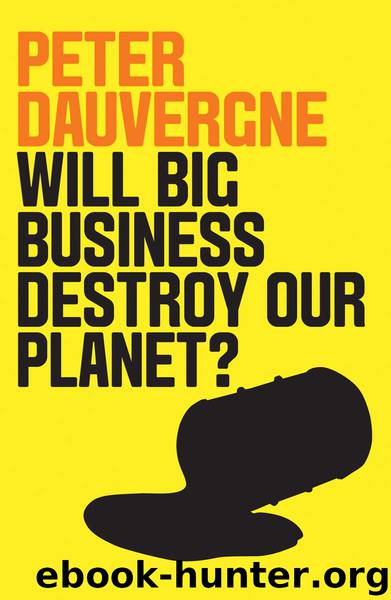Will Big Business Destroy Our Planet? by Peter Dauvergne

Author:Peter Dauvergne
Language: eng
Format: epub
ISBN: 9781509524044
Publisher: Wiley
Published: 2018-04-23T00:00:00+00:00
Breaking the law
Volkswagen’s 2016 Annual Report – subtitled a “New Beginning” – says the company is now “committed to sustainable, transparent and responsible corporate governance.”9
Volkswagen’s new beginning included pleading guilty in 2017 to charges in the USA of conspiracy, fraud, and obstruction of justice for secretly installing illegal computer software into its diesel automobiles. Known as a “defeat device,” this software kicked in during emissions testing to lower nitrogen oxide levels. Starting in 2009 this device put Volkswagen and Audi models on American roads that were spewing out pollution as much as forty times above the US legal limits.
It may seem commendable to take responsibility and plead guilty to criminal charges. Yet, when US investigators first became suspicious of what Volkswagen might be up to, the initial response of executives was to attack the investigation as incompetent and the science underlying the suspicions as faulty. One investigator would later tell the New York Times: “They tried to poke holes in our study and its methods, saying we didn’t know what we were doing. They were very aggressive.” Then, as incontrovertible proof of wrongdoing began to emerge in 2015, Volkswagen executives stalled, lied, and ordered employees to delete computer files and destroy evidence.10
Volkswagen’s obfuscation didn’t end there. Just weeks before pleading guilty to the US charges, the managing director of Volkswagen UK, Paul Willis, was telling members of the British parliament that the company had “misled nobody.” When incredulous MPs pushed back, Willis ducked their questions, declaring himself “open” and, although unable to remember much, doing his best to answer “transparently.” Conservative MP Mark Menzies was unimpressed. “You come before us and your mouth opens and words cascade out and then the next time you come before us those words have changed in meaning.”11
The story of the defeat device is a reminder of the lengths even highly respected companies will go to expand markets and seek profits. Martin Winterkorn, the CEO of Volkswagen during the scandal, had set his sights on passing Toyota to become the world’s biggest automaker. At the opening of a new Volkswagen plant in Tennessee in 2011 he confidently told a group of American lawmakers, “By 2018, we want to take our group to the very top of the global car industry.”12
To take down Toyota, Winterkorn felt he needed a larger share of the American market. But his engineers were struggling to meet relatively high US emission standards without sacrificing the fuel efficiency and performance advantages of Volkswagen’s diesel cars, which Winterkorn saw as having the best prospects of strong sales.
In retrospect, the solution – to compete against the Prius Hybrid by introducing into the American market “clean diesel” cars equipped with an emission-control disabling device to increase gas mileage – might look extraordinarily risky. Yet in many ways it is not that surprising given the competitive pressures on automakers and the large performance bonuses for CEOs. Volkswagen is not the first automaker to install a device to thwart environmental regulations. Others, including Volkswagen, installed technologies in the early 1970s to shut off pollution controls to enhance performance.
Download
This site does not store any files on its server. We only index and link to content provided by other sites. Please contact the content providers to delete copyright contents if any and email us, we'll remove relevant links or contents immediately.
| Anthropology | Archaeology |
| Philosophy | Politics & Government |
| Social Sciences | Sociology |
| Women's Studies |
The Secret History by Donna Tartt(19032)
The Social Justice Warrior Handbook by Lisa De Pasquale(12183)
Thirteen Reasons Why by Jay Asher(8885)
This Is How You Lose Her by Junot Diaz(6872)
Weapons of Math Destruction by Cathy O'Neil(6261)
Zero to One by Peter Thiel(5782)
Beartown by Fredrik Backman(5734)
The Myth of the Strong Leader by Archie Brown(5494)
The Fire Next Time by James Baldwin(5424)
How Democracies Die by Steven Levitsky & Daniel Ziblatt(5211)
Promise Me, Dad by Joe Biden(5141)
Stone's Rules by Roger Stone(5080)
A Higher Loyalty: Truth, Lies, and Leadership by James Comey(4946)
100 Deadly Skills by Clint Emerson(4912)
Rise and Kill First by Ronen Bergman(4776)
Secrecy World by Jake Bernstein(4738)
The David Icke Guide to the Global Conspiracy (and how to end it) by David Icke(4697)
The Farm by Tom Rob Smith(4500)
The Doomsday Machine by Daniel Ellsberg(4482)
